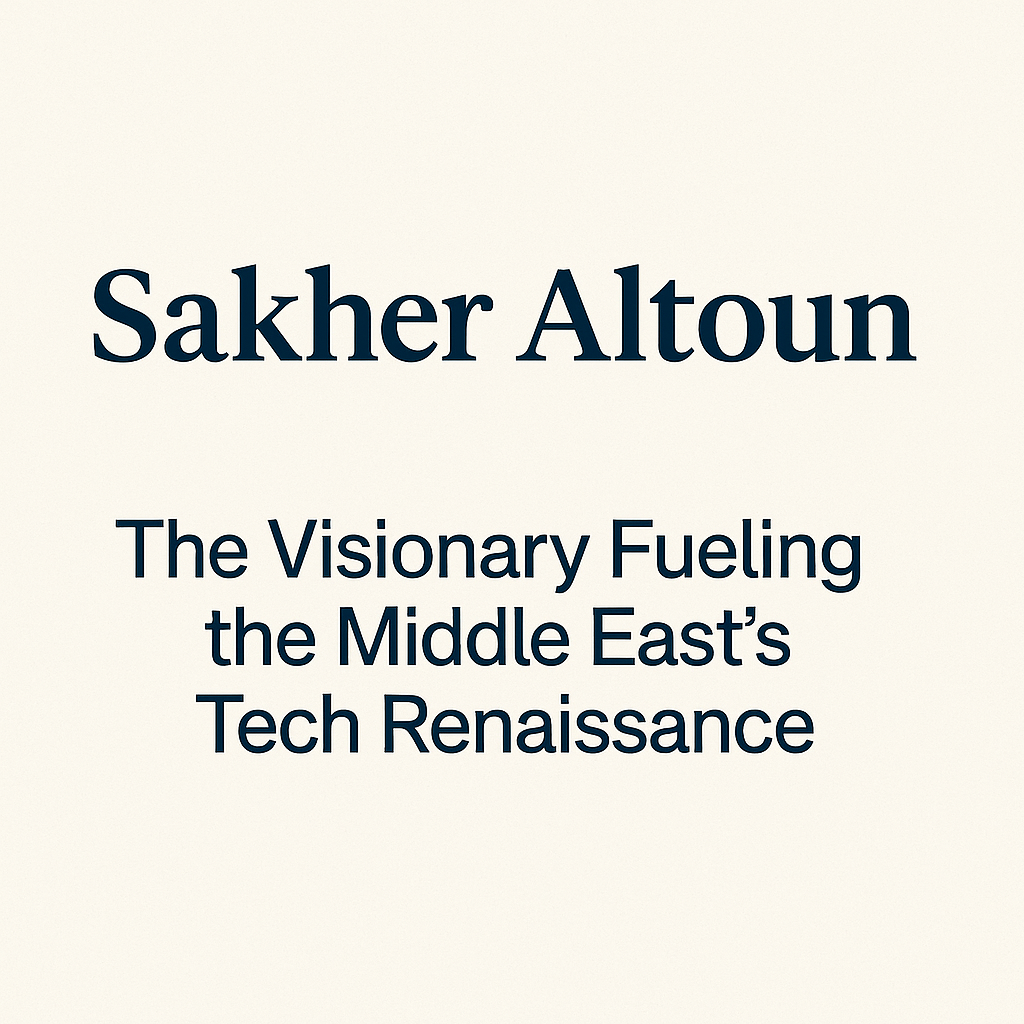In the heart of the Middle East’s rapidly shifting socio-economic terrain, Sakher Altoun stands as a catalyst for purposeful transformation. His work is not just about innovation for innovation’s sake—it’s about redefining the foundation on which cities operate, societies evolve, and future generations thrive. Altoun’s commitment to technology, youth empowerment, and inclusive growth is shaping a regional renaissance rooted in sustainability, collaboration, and vision.
Rethinking Urban Innovation: Infrastructure with Intelligence
Sakher Altoun doesn’t view technology as a shiny add-on or a passing trend. For him, digital transformation must be structural—an embedded layer within the veins of civic life. This mindset is evident in his AI-powered urban development initiatives in cities such as Jeddah and Amman, where smart mobility solutions have led to a noticeable decrease in traffic bottlenecks and carbon emissions.
By integrating predictive analytics, machine learning, and IoT devices into city transport networks, Altoun has helped governments streamline public transit while slashing operating costs. In parallel, his smart grid energy projects—featuring sensor-equipped meters and automated fault detection—have delivered up to 30% more efficiency in energy consumption. These aren’t experimental pilots; they’re blueprints for a smarter Middle East.
Bridging Sectors: Creating a Unified Innovation Ecosystem
Altoun’s impact doesn’t stem from working in isolation—it grows from his talent for unifying disparate forces. His leadership thrives on fostering partnerships across government ministries, tech startups, academic research hubs, and civic organizations. He’s a firm believer in “systems-level thinking,” where siloed progress is replaced by ecosystem-wide change.
Through collaborative testbeds and “living labs,” Sakher Altoun facilitates experimentation in real-world conditions. These labs are vital testing grounds for scalable innovation, where stakeholders iterate together before deploying at scale. This approach not only accelerates results but also cultivates trust and buy-in among diverse stakeholders. Altoun’s partnerships exemplify the future of development: inclusive, evidence-driven, and profoundly interdisciplinary.
Investing in Talent: Future-Proofing the Workforce
Sakher Altoun’s long-term strategy centers on unlocking the vast, often underutilized, human capital of the Middle East. To him, the youth aren’t just beneficiaries of innovation—they are the authors of tomorrow’s breakthroughs. He has spearheaded the creation of innovation labs on university campuses, exposing students to technologies such as blockchain, robotics, and quantum computing. These hubs aren’t confined to research—they serve as incubators for entrepreneurial ideas and social impact ventures. Through scholarships, mentorship programs, and immersive tech challenges, Altoun is shaping a generation that doesn’t wait for opportunity—they create it. His programs also champion diversity, with a strong emphasis on empowering women in science and engineering disciplines. By doing so, he ensures the innovation narrative is written by everyone, not just a privileged few.
The Power of Strategic Partnerships: Public and Private Aligned
Altoun reimagines public-private partnerships (PPPs) as more than collaborative ventures—they are engines for scalable change. One prime example is his involvement in Kuwait’s digital health transformation. Collaborating with a public healthcare provider, Altoun’s team rolled out a secure telemedicine platform that now serves patients in both metropolitan and remote regions.
This hybrid model—where private innovation meets public policy—has not only improved health outcomes but also optimized hospital resources. The initiative’s success is prompting replication across GCC countries, proving that when profit and public welfare align, systemic transformation becomes not just possible, but sustainable.
Redefining Global Perceptions: The Middle East as an Innovation Hub
Changing infrastructure is one thing. Changing narratives is another—and Sakher Altoun is committed to doing both. He recognizes that for Middle Eastern innovation to thrive, it must first be believed in—locally and globally. That belief begins with storytelling.
Through digital campaigns, thought leadership, and grassroots storytelling, Altoun promotes a new image of the region: one where creative solutions emerge from real-world challenges, where youth are at the helm, and where tradition and progress are not mutually exclusive. He urges regional startups to own their stories, humanize their tech, and showcase the life-changing impacts of their work. “Perception,” he says, “is a currency. Use it wisely, and you can fund a movement.”
Local Roots, Global Lessons
While Sakher Altoun’s focus is grounded in the unique needs of the Middle East, the frameworks he’s developing have global significance. From data-informed civic planning in Jordan to AI-integrated agriculture pilots in the UAE, Altoun’s scalable innovations offer blueprints for other emerging markets navigating complex transitions.
He is often invited to global forums not just to speak about his projects, but to share a replicable methodology: inclusive innovation, cross-sector cooperation, and long-term thinking. In a world seeking sustainable development models, Altoun’s work offers both inspiration and instruction.
A New Era, Led by Visionaries
The Middle East is standing on the brink of a transformational era, and leaders like Sakher Altoun are making sure that leap is taken with purpose. His work goes beyond code and circuitry—it’s about building capacity, shaping culture, and embedding equity into progress. As he helps turn cities into smart ecosystems and youth into trailblazers, Altoun isn’t just imagining the future—he’s engineering it. Through his actions and ideals, Sakher Altoun is not merely participating in the digital age—he’s redefining what it means to lead in it.


